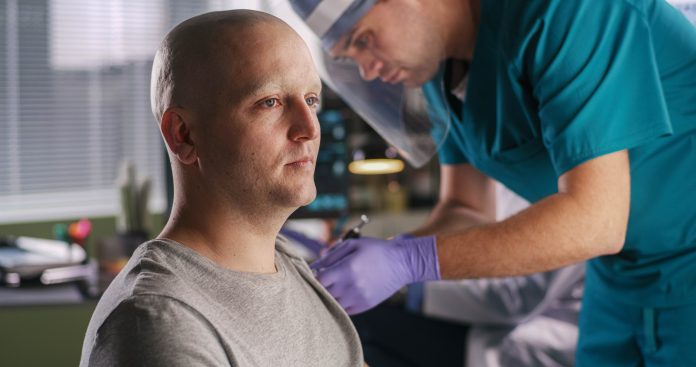Patients with advanced skin cancer in England are set to be fast-tracked into trials of a new cancer vaccine
The cancer vaccine is given for up to two years and works by boosting the immune system’s response and helping it recognise, attack, and ‘remember’ cancer cells to help stop the disease from returning.
The NHS has partnered with UK life-sciences company Scancell to improve patient access. Seven sites were initially registered, and the first patients are expected to be referred in May 2025.
Cancer Vaccine Launch Pad broadens scope with melanoma cancer vaccine
The trial is the latest part of NHS England’s Cancer Vaccine Launch Pad (CVLP), a world-first programme to fast-track eligible patients to studies developing vaccines against different cancers at their nearest participating hospital.
The Launch Pad has already helped thousands of patients to access trials of a personalised vaccine against bowel cancer, with more than 350 patients fast-tracked for consideration. It has expanded to include a trial for melanoma.
NHS National Cancer Director, Professor Peter Johnson, said: “Skin cancer can have a devastating impact and we know that cancer vaccines have the potential to revolutionise cancer care for patients in this country and across the world – and to save more lives.
“It’s incredibly exciting that the NHS is expanding its world-leading programme so more patients with different types of cancer could benefit from developing new vaccines that could stop their cancer coming back.
“We want to ensure as many eligible NHS patients as possible have access to these vital trials, which is why we are working with a range of industry partners as more studies get up and running to ensure patients are fast-tracked to a vaccine that could transform lives.”
iSCIB1+ enhances response to immunotherapy
Melanoma is the 5th most common cancer in the UK, accounting for around 4% of all new cancer cases. Around half of melanoma patients respond to standard care; however, people who do not respond are at higher risk of their cancer progressing.
The new DNA vaccine, known as iSCIB1+ (Immunobody®), targets biomarkers specific to melanoma tumours acting as a flag to alert the immune system. This triggers the activation of T cells, which seek out, attack and destroy the cancer cells, inducing a lasting response by creating an immune ‘memory’ that may prevent the cancer from returning.
The phase II trial, known as SCOPE and the NHS CVLP – co-ordinated by the Southampton Clinical Trials Unit – aims to expand the number of patients able to take part and recruit dozens of patients by October. To be eligible for the trial, advanced melanoma patients without treatment will need a blood test to determine their tissue type. This test looks at genes that control how the immune system works, which vary from person to person.
Minister of State for Health, Karin Smyth, said: “As someone who has overcome skin cancer, I know that every advancement in treatment brings hope to patients and their families.
“This innovative collaboration through our Cancer Vaccine Launch Pad could transform how we treat advanced melanoma. By fast-tracking eligible patients into clinical trials nationwide, we’re ensuring more people can access potentially life-saving innovations while supporting crucial research.
“This is just the start; our Plan for Change will continue driving fundamental reform of the NHS to ensure it delivers for all patients once again.”
Professor Gareth Griffiths, Director of the Southampton Clinical Trials Unit, said: “It is fantastic to see the expansion of the Cancer Vaccine Launch Pad with the addition of this melanoma cancer vaccine trial. Our team have been working hard with Scancell to bring the trial onto the CVLP platform, and we hope that by being part of this ground-breaking programme, we can help to increase referrals for this trial and give more patients with advanced melanoma access to new, potentially life-saving treatments.”
Dr Iain Foulkes, Executive Director of Research and Innovation at Cancer Research UK, said: “Cancer vaccine research continues to show promise and the Cancer Vaccines Launch Pad is an essential route to fast-track this technology into clinical trials.
“Research into targeted cancer treatments is vital. There are over 200 different types of cancer, and it’s unlikely there will ever be a single cure that works for everyone. That’s why we must support a wide range of research so that more people can live longer, better lives, free from the fear of cancer.”











